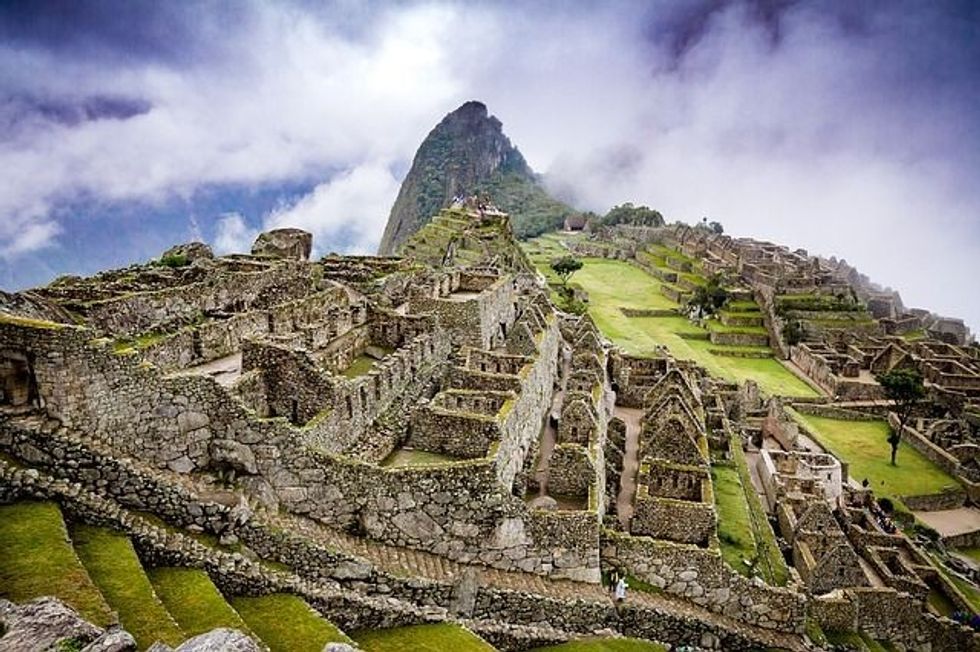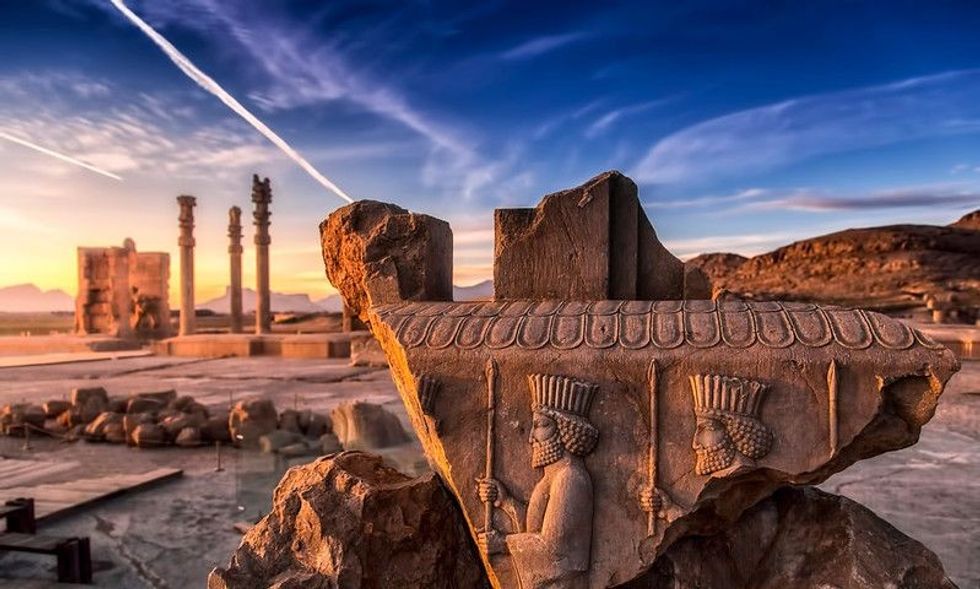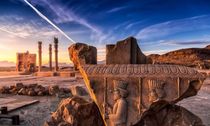177 Incredible Ancient City Names From Around The World

Any ancient cities that were a part of an ancient world empire many years ago make for a popular archeological site in modern times.
Mohenjo Daro, Machu Picchu, Mesa Verde, La Ciudad Perdida are some of oldest cities of the ancient workd established many years ago. Most of these cities were a part of an empire in their respective regions worldwide.
While centuries have passed, the remains of these cities can still be found in the modern day across the world. Many of these cities make for popular archeological sites. Read on for names of some of the most popular ancient city names worldwide.
Ancient Egyptian City Names
Egypt, a civilization of Africa, is as ancient as the existence of Pharaohs. Several old monuments are present along the Nile River Valley. The country is the abode of several ancient cities, as described below.
Alexandria (Ancient Greek Origin), meaning 'defender of mankind,' was extensively populated and located on the delta of the West Nile. One of the world's popular cities even in the present day.
Cairo (Arabic Origin), meaning 'victorious one,' was an ancient city located on the eastern shore of the River Nile.
Aswan (Egyptian Origin), meaning, 'charmed', was known for its distinguished archeological sites and the scenery of the Nile Valley.
Memphis (Greek Origin), meaning, 'enduring', was located in the south of the delta of the Nile river, some miles away from Cairo.
Abydos (Greek Origin), meaning, 'reliquary', was famous for its temple of Seti I and was a pilgrimage place for all Egyptians.
Luxor (Latin Origin), meaning, 'the forts', was known for having the ruins of the air museum known as the greatest in the world.
Kom Ombo (Arabic Origin), meaning, 'hill of gold', was famous for its tombs, temples, and archaeological sites. One of the lost cities found centuries ago.
Thebes (Greek Origin), meaning, the 'city of Amon', was the prime center for worshiping the God Amon.
Avaris (Egyptian Origin), meaning, 'house', was popular for its archaeological discoveries and history.
Asyut (Egyptian Origin), meaning 'guardian', was famous for making shawls and has a big textile industry.
Tanis (Greek Origin), meaning, 'serpent Goddess', was known for its tombs and unique treasures buried within its soil.
Giza (Arabic Origin), meaning, 'hewn stone', is famous for its tall temples and pyramids.
Amarna (Egyptian Origin), meaning, 'princess of Egypt', was a city made upon a unique type of city planning comparable to modern-day ones.
Hermopolis (Greek Origin), meaning, the 'city of Hermes', was a center of worship of God Thoth and has many scribes.
Heracleion (Ancient Greek Origin) was a city that was known for its trades and ports.
Faiyum (Egyptian Origin), meaning, 'lake', is the oldest city of Egypt known for its soil fertility.
Pi-Ramesses (English Origin), meaning 'House of Ramesses', was among the largest cities built to exemplify Egypt's splendor.
Esna (Arabic Origin), meaning, 'fear of God', is famous for its Khnum Temple, the God with a ram's head.
Tell Basta (Egyptian Origin), meaning, 'Domain of Bastet', is the place of Christian pilgrimage and the old temple of Bast.
Heliopolis (Greek Origin), meaning, 'city of the sun', was an important religious center and the worship site of the Sun God.
Dendera (Egyptian Origin) has the Dendera Temple Complex, one of ancient Egypt's best-preserved temple sites.
Qus (Egyptian Origin) was the second most significant Islamic city.
Crocodilopolis (Egyptian Origin) was the chief place of worship of God Sebek, the crocodile God.
Sais (Arabic Origin), meaning, 'servant', was the center of African and Mediterranean trade and was full of palaces and temples
Avaris (Egyptian Origin), meaning 'house of the region', was the trade capital of Egypt, abandoned in 1550 BC.
Elephantine (Egyptian Origin), meaning 'similar to elephant's tusk', was the abode of Khnum, believed to have controlled the Nile.
Akhetaten (Greek Origin), meaning 'beneficial to Aten', is located on the eastern bank of the Nile.
Fustat (Arabic Origin), meaning, 'tent', became Egypt's first capital under the governance of Muslims.
Letopolis (Greek Origin), meaning 'land of Khem', was situated on the western bank of the Nile river under Horus.
Rosetta (Italian Origin), meaning, 'splendid', is a port city that was targeted by many invaders over history.
Damanhour (Egyptian Origin), meaning, 'city of God Horus', consisted of a temple dedicated to God Horus.
Naucratis (Greek Origin), meaning, 'naval command', was located on the Nile river's canopic branch southeast of Alexandria.
Menouthis (Egyptian Origin), meaning, 'mother of God', was a sacred city devoted to the Goddess Isis and God Serapis of Egypt.
Ancient Roman City Names
The beginning of the ancient Roman civilization dates back to the 8th century BC with the establishment of the city of Rome and ends in the 5th century AD with the downfall of the Western Roman Empire. A list of the ancient cities of Rome has been presented below.
Carthage (Phoenician Origin), meaning 'new town', was an important trading center of the Mediterranean civilization.
Antioch (Greek Origin), meaning, 'resistant', was known for the form of its unique temples, baths, and theatres.
Mediolanum (Roman Origin), meaning, 'midfield', was known for its fine wool, wine, and road networks.
Pompeii (Roman Origin), meaning 'five', was destroyed by the eruption of Mount Vesuvius.
Ephesus (Roman Origin), meaning, the 'kingdom of mother Goddess', was a city that had important ports useful for trading.
Athens (Greek Origin), meaning 'from Athena', was an important worship center for Goddess Athena.
Herculaneum (Greek Origin), meaning, 'ancient city', was a city located on the bay of Naples and destroyed by Mount Vesuvius.
Londinium (Latin Origin), meaning, 'Latin London', was known for its road and trading systems.
Constantinople (Greek Origin), meaning, 'into the city', was a natural harbor and one of the wealthiest cities of Rome.
Ravenna (Italian Origin), meaning, 'raven', was popular for its heritage and architecture.
Camulodunum (Celtic Origin), meaning 'forest of camulos', had two large theatres and was also a royal stronghold.
Ostia Antica (Latin Origin), meaning 'mouth', is known for its distinguished mosaic designs and best-preserved buildings.
Caesarea (Latin Origin), meaning, 'leader', was an artificial and one of the most successful harbors of Ancient Rome.
Lugdunum (Latin Origin), meaning 'light', was known for its high ground and was the capital of the Roman province.
Emerita Augusta (Latin Origin), meaning, 'imperial', was a large city and was used as a pilgrimage center.
Viroconium Cornoviorum (Gaelic Origin), meaning 'werewolf', was a Roman city known for its road system and the distribution of baths.
Durnovaria (Latin Origin), meaning, 'knob', was the ancient name of the Roman town of Dorchester.
Isca Dumnoniorum (Latin Origin), meaning, 'full of fish', is one of the lost cities that was a trading center.
Lindinis (Roman Origin), meaning, 'Roman town on the river Gifl', was famous for its beaded jewelry.
Seville (Latin Origin), meaning, 'slave', was famous for its attractive floor with intricate mosaics and luxurious houses.
Verona (Italian Origin), meaning, 'honest', has ancient Roman remains, the Roman amphitheater, and an archeological museum.
Sirmium (Roman Origin), meaning 'flowing water', was a significant strategic and military center of the Roman colony.
Aquileia (Roman Origin) was a cheerful city, among the biggest cities of Rome, and had ports on the Adriatic sea.
Roma (Roman Origin), meaning 'man', was an eternal city and center of the catholic church. During the second century, it was under the rule of Septimius Severus.
Cosa (Latin Origin) was an incredible site for several temples such as the Capitolium of Cosa.
Belum (Roman Origin), meaning 'war', was one of the cities of ancient Rome.
Italica (Roman Origin) was founded by the Roman Empire and was the first city to be located beyond Italian territory.
Bononia (Roman Origin), meaning 'settlement', is an ancient village in Serbia.
Pistoria (Roman Origin) situated on the valley of river Ombrone, was a half-circle of hills.
Brigantium (Proto-Celtic Origin), meaning 'the high one', was a town in the Roman province of Britannia.
Florentia (Roman Origin), meaning, 'to blossom', was situated in the Arno valley, believed to be built by Gaius Julius Caesar's legions.
Ancient Greek City Names
Ancient Greece ranged throughout the northeastern Mediterranean Civilization between the 12th century BC-9th century BC consisting of city-states, territories, and now lost cities, all of which were united only once under the rule of Alexander the Great.
Athens (Greek Origin), meaning, 'from Athena', was the largest city of Greece and also the most influential. One of the ancient Greece city names that are popular even in the present day.
Corinth (Greek Origin), meaning, 'antiquity', was an important place for activities including royalties. A region that is well known even in the present day.
Syracuse (Greek Origin), meaning, 'island of Sicily', was known for its culture, architecture, and history.
Argos (Greek Origin), meaning, 'vigilant guardian', was named after the son of Zeus who was said to be the king of this place.
Rhodes (Old English Origin), meaning, 'clearing', is known for its famous antiquity the 'Colossus of Rhodes'.
Miletus (Greek Origin), meaning, 'red earth', was known for a large number of colonies present near it.
Chalcis (Greek Origin), meaning, 'bronze', was a famous city known for its trade and livestock.
Larissa (Greek Origin), meaning, 'citadel', was a popular center for trade and agriculture.
Thebes (Greek Origin), meaning 'city of Amon', was known for its unique kind of silk.
Antioch on the Orotes (Greek Origin), meaning, 'resistant', is known for its history and unique kind of archaeological treasures.
Olympia (Greek Origin), meaning 'of Mount Olympus', was an ancient city that was famous for the worship of Zeus.
Patras (Greek Origin), meaning, 'leaf', was known for its carnival which included parades and satirical floats.
Eretria (Greek Origin), meaning, 'life giver', was one of the lost cities known for its artifacts made from stone and pottery.
Alinda (Germanic Origin), meaning, 'noble shield', was an important commercial city known for its statues.
Cyrene (Greek Origin), meaning, 'supreme power', was a famous archeological site that had numerous temples.
Aegina (Greek Origin), meaning, 'island in the Aegean sea', was one of the popular North European towns of the time.
Abydos (Greek Origin), meaning, 'hill of the symbol', was a famous site for burying pharaohs.
Enez (Greek Origin), meaning, 'friend', was a famous town in Ancient Greece known for its trade.
Akrai (Greek Origin) was an ancient city famous for its monuments.
Megara (Greek Origin), meaning 'great', was an ancient city famous for farming and the rearing of animals.
Byzantium (Greek Origin), meaning, 'city on the bosporus', was a wealthy city popular for its trading system. One of the popular North European names of the time.
Smyrna (Greek Origin), meaning 'myrrh', was among the 'first city of Asia', home of the ancient bishopric and the Christian church.
Olbia (Greek Origin), meaning, 'happy town', was a treasure of culture, sea, beaches, and other destinations.
Thessaloniki (Greek Origin), meaning 'Thessalian victory', is a popular region across the world even in the present day.
Acanthos (Greek Origin), meaning, 'prickly plant', was situated on the Athos peninsula and was the colony of Andros.
Acharnae (Greek Origin), meaning, 'seabass', was a significant city of ancient Greece.
Apollonia (Greek Origin), meaning, 'protector', witnessed Roman-Greek culture with its monuments and heritage.
Corfu (Italian Origin), meaning, 'city of the peaks', was a powerful city that participated in the battle of Sybota.
Calydon (Greek Origin) was a Greek city situated upon the Euenus river in ancient Aetolia.
Celenderis (Greek Origin) was one of the ancient cities of Greece.
Demetrias (Greek Origin), meaning, 'follower of Demeter', located on the Pagasaean Gulf, was a city in east-central Greece.
Ephesus (Greek Origin), meaning, 'city of the Mother Goddess', is an ancient port city.
Ephyra (Latin Origin), meaning, 'daughter of Oceanus', was located near the river Selleeis.
Ancient Persian City Names
Iran was popular as Persia in the western world till the mid-20th century. Read on for ancient Persian city names: -
Persepolis (Ancient Greek Origin), meaning, 'city of Persians', was an ancient city famous for its technology, urban planning, and agriculture.
Isfahan (Persian Origin), meaning, 'armies', was a popular place known for monuments, artifacts, and mosques. A region well-known across the world even in the present day.
Shiraz (Persian Origin), meaning 'wine', was popular for its literature, poets, and greenery.
Susa (English Origin), meaning 'lily', was known to be a city present in different civilizations.
Pasargadae (Old Persian Origin), meaning 'strong club', has the famous monument of the tomb of Cyrus the Great.
Ctesiphon (Ancient Greek Origin) was a famous place that had the Royal Palace of the Persian civilization.
Tabriz (Greek Origin), meaning, 'bull', was an ancient city that had a large variety of monuments.
Ray (Old French Origin), meaning, 'stream', was the capital city of the Persian Empire famous for its silk weaving.
Yazd (Persian Origin), meaning, 'God', is known for its exquisite Persian architectural style.
Mashhad (Arabic Origin), meaning 'martyrium', was the holy home city of Iran, home to Imam Reza.
Khorramabad (Iranian Origin), meaning, 'land of the lurs', was an ancient city chiefly known for its market and army strength.
Nishapur (Persian Origin) is famous for its juices and its turquoise.
Babylon (Latin Origin), meaning 'gates of God', was an ancient city widely famous for its architecture, art, and impenetrable walls.
Amol (Sanskrit Origin), meaning 'priceless', is an important city famous for trade and agriculture.
Sardis (Persian Origin), meaning 'joy', has a well-preserved history with a number of iconic temples in the world.
Qom is a holy city and exhibits the shrine of Mausam-e-Qom, a fast-growing city with an increasing population.
Kashan (Arabic Origin), meaning, 'land of rulers', is popular for its carpet and rose water.
Kashmar (Zoroastrian Origin) is the fourth pilgrimage city of Iran.
Ecbatana (Ancient Greek Origin) was a place of summer residence to the Parthian and Achaemenian Kings.
Kermanshah, meaning, 'King of Kerman', was among the first for the cultivation of crops.
Ardabil (Zoroastrian Origin), meaning 'holy place', is famous for its carpets and silk.
Herat (Iranian Origin), meaning, 'with velocity', was an important trading center from the Mediterranean to China to India.
Hamedan (Arabic Origin), meaning 'the praised one', is an ancient city and abode of many cultural celebrities and poets.
Qazvin, meaning, 'an ancient tribe', famous as Iran's calligraphy capital, is the center of political newspapers, carpet, and others.
Hatra (Arabic Origin), meaning 'enclosure', was an important trading and religious center of the Parthian Empire.
Bukhara (Sanskrit Origin), meaning, 'temple', was a significant center of religion, culture, scholarship, and trade.
Samarqand (Turkish Origin), meaning 'rich settlement', was a crucial export center.

Ancient Chinese City Names
Here are some popular ancient city names from China for your perusal: -
Beijing (Chinese Origin), meaning 'northern capital', is known for its architectural and historical significance.
Hangzhou (Chinese Origin), meaning 'square boat prefecture', is a city renowned for its gardens and architecture.
Xi'An (Chinese Origin), meaning 'salty', is a city that has been the capital of many dynasties.
Nanjing (Chinese Origin), meaning 'southern capital', is famous for its mountains, palaces, and landscapes.
Luoyang (Chinese Origin), meaning 'the sunny side', used to be a Buddhist capital and a capital of many dynasties.
Kaifeng (Chinese Origin), meaning 'new territory', is known for having the oldest Jewish community.
Anyang (Chinese Origin), meaning 'crocodile', has been a center of trade and architecture for many years.
Zhengzhou (Chinese Origin), meaning 'Zheng settlement', is known for its large coal reserves and reserves of different minerals.
Suzhou (Chinese Origin), meaning 'province of Su clan', is a famous heritage center having many temples, sculptures, and pavilions.
Dunhuang (Chinese Origin), meaning, 'blazing beacon', was the first trading town of western China.
Xiamen (Chinese Origin), meaning, 'mansion gate', is a city well known for its culture and low pollution.
Tianjin (Chinese Origin), meaning 'heavenly Ford', is a port city known for its gateway and seaports.
Chang'an (Chinese Origin), meaning, 'perpetual peace', is a famous center for manufacturing, religion, and commerce.
Jiayuguan (Chinese Origin) is a city known for its industries and manufacturing of steel.
Huizhou (Chinese Origin) is known for its cultural heritage, relics, and traditional customs.
Changchun (Chinese Origin), meaning 'long spring', is an important industrial center in China.
Zhaoqing (Chinese Origin), meaning 'beginning auspiciousness', is known for its city walls and its size.
Xinjiang (Chinese Origin), meaning 'new frontier', is known for its culture, sceneries, and food.
Shangqiu (Chinese Origin), meaning 'upon sea', is known for its unique culture and history.
Jiuquan (Chinese Origin), meaning 'wine spring', is known for its silk production and culture.
Zhongdu (Chinese Origin), meaning 'central capital', was the Jin dynasty's capital in medieval China.
Yanjing (Chinese Origin), meaning 'capital', was famous as the capital of Yan.
Xitang (Chinese Origin), meaning 'stone skin lane', is a water town that has 9 rivers crossing across it.
Tanheli (Chinese Origin) is famous as a cultural center of the Bronze age.
Chengdu (Chinese Origin), meaning 'establishes capital', is famous for its fine satins and brocades, display of its culture and luxury.
Nanxun (Chinese Origin), meaning 'stream of southern wood', is an ancient town in the district of Huzhou.
Zhuxian (Chinese Origin), meaning 'attack of heaven', is situated southwest of Kaifeng city.
Miran (Kurdish Origin), meaning 'peace', is an ancient oasis town situated in northwest China.
Wangchen (Chinese Origin), meaning, 'powerful', is an ancient city in China.
Henglong (Chinese Origin) is situated in northern China and is a center for entertainment, culture, and business.
Ancient Japanese City Names
There are a number of ancient lost cities in Japan that still are as beautiful as ever. The names are mentioned below.
Osaka (Japanese Origin), meaning 'large hill', was the first capital of Japan and a famous hub for trade.
Kyoto (Japanese Origin), meaning, 'imperial city', is home to many historical areas and cultural landmarks.
Tokyo (Japanese Origin), meaning, 'eastern capital city', has been the modern center of culture and politics for 4 centuries.
Fukuoka (Japanese Origin), meaning, 'luck', was a city famous for its culture and history artifacts.
Sapporo (Japanese Origin), meaning, 'dry river', was a city known for its architectural and agricultural systems.
Yokohama (Japanese Origin), meaning 'horizontal beach', is an ancient city present in Japan.
Nagoya (Japanese Origin), meaning 'peaceful', was the birthplace of many feudal lords and was famous for its castles.
Nara (Japanese Origin), meaning, 'happy', was one of the capitals of ancient Japan that has famous buildings and artifacts.
Nagasaki (Japanese Origin), meaning 'long headland', is an ancient city present in Japan.
Kagoshima (Japanese Origin), meaning, 'deer island', was known for its volcanoes and architectural style.
Kanazawa (Japanese Origin), meaning 'marsh of gold', was the abode of the Samurais of the Maeda clan, a great ruling clan.
Sendai (Japanese Origin), meaning, 'city of trees', underwent reconstruction after World War II due to damage.
Takayama (Japanese Origin), meaning 'high mountains', is home to numerous temples and old buildings such as the Kokubun temple.
Tokushima (Japanese Origin), meaning 'benevolence', has numerous excavators of Dotaku and the center of the formation of Kokufu.
Hakodate (Japanese Origin), meaning 'building', is famous as Japan's first port city that opened to foreign trade.
Himeji (Japanese Origin), meaning 'cotton textile center', boasts the Himeji Castle, the best-preserved architecture of ancient Japan.
Matsue (Japanese Origin), meaning 'prosperity', was considered a city built on water and had a strong feudal character.
Naha (Japanese Origin), meaning 'origin of the sun', boasts numerous Japanese shrines and castles.
Matsuyama (Japanese Origin), meaning 'pine tree mountain', preserves the oldest hot springs in Japan.
Ise (Japanese Origin), meaning 'energy', has historical importance in terms of numerous shrines.
Kamakura (Japanese Origin), meaning 'barn', was popular as the base for the mighty Minamoto clan.
Otsu (Japanese origin), meaning 'second', is a port city and is home to numerous historic sites and temples.
Kurashiki (Japanese Origin), meaning 'storehouse', is famous for the Ohara Museum.
We Want Your Photos!
More for You
Sources
https://amp.interestingengineering.com/the-31-lost-cities-you-might-not-know-from-the-city-that-sank-in-one-night-to-the-refuge-city-of-the-rainforest
https://www.roughguides.com/gallery/20-great-lost-cities/
https://www.touropia.com/lost-cities/
https://www.businessinsider.com/largest-cities-in-history-2011-4?amp
https://traveltriangle.com/blog/lost-cities-of-the-world/amp/
https://www.historyhit.com/guides/the-most-amazing-ancient-cities-in-the-world/
Bachelor of Science specializing in Mass Communication.

Adekunle Olanrewaju JasonBachelor of Science specializing in Mass Communication.
Bachelor of Fine Arts specializing in International Business

Vikhaash SundararajBachelor of Fine Arts specializing in International Business
With a background in International Business Management, having completed his degree at the University of Hull. Vikhaash has volunteered with 'Teach For India' to help students create a monthly newsletter. In his free time, he enjoys sports and was the assistant captain of his school's hockey team. He has also gained marketing experience through an internship at Decathlon Sports India.
Disclaimer
1) Kidadl is independent and to make our service free to you the reader we are supported by advertising. We hope you love our recommendations for products and services! What we suggest is selected independently by the Kidadl team. If you purchase using the Buy Now button we may earn a small commission. This does not influence our choices. Prices are correct and items are available at the time the article was published but we cannot guarantee that on the time of reading. Please note that Kidadl is a participant in the Amazon Services LLC Associates Program, an affiliate advertising program designed to provide a means for sites to earn advertising fees by advertising and linking to Amazon. We also link to other websites, but are not responsible for their content.
2) At Kidadl, we strive to recommend the very best activities and events. We will always aim to give you accurate information at the date of publication - however, information does change, so it’s important you do your own research, double-check and make the decision that is right for your family. We recognise that not all activities and ideas are appropriate for all children and families or in all circumstances. Our recommended activities are based on age but these are a guide. We recommend that these ideas are used as inspiration, that ideas are undertaken with appropriate adult supervision, and that each adult uses their own discretion and knowledge of their children to consider the safety and suitability. Kidadl cannot accept liability for the execution of these ideas, and parental supervision is advised at all times, as safety is paramount. Anyone using the information provided by Kidadl does so at their own risk and we can not accept liability if things go wrong.
3) Because we are an educational resource, we have quotes and facts about a range of historical and modern figures. We do not endorse the actions of or rhetoric of all the people included in these collections, but we think they are important for growing minds to learn about under the guidance of parents or guardians.







